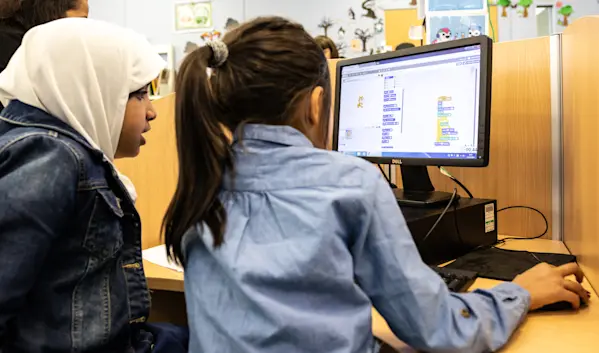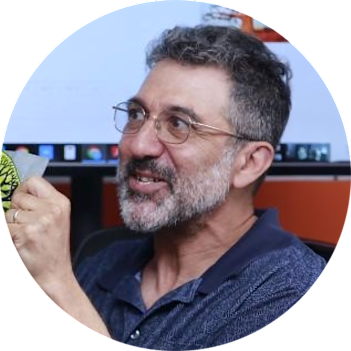Equity, diversity and inclusion
In the first half of 2021, we hosted a series of seminars to hear from researchers working on topics related to equity, diversity, and inclusion in computing. Watch recordings, read our summary blogs, and download speakers' slides.

Computing for generative justice: decolonizing the circular economy (13 July 2021)

Speaker: Ron Eglash (University of Michigan)
Working with African, Native American and Latin American Indigenous cultures, we can see a contradiction to colonial stereotypes of “primitive” societies. Support for egalitarian social relations, circular economies, and ecological biodiversity in these traditional contexts are “proof of concept” for how they could be accomplished. Working with their modern descendants in CS education and community development, we can develop collaborative practices that bring together “bottom-up” cultural traditions such as African fractals, Native American biocomplexity and restorative justice with contemporary computing technologies and frameworks.
Dr Ron Eglash obtained his B.S. in cybernetics and his M.S. in systems engineering at UCLA. He received his doctorate at UCSC in History of Consciousness under Donna Haraway. Ron was a faculty member in the STS department at RPI for two decades; he is now a Professor in the School of Information at the University of Michigan. He is known for his monograph African Fractals: modern computing and indigenous design; his anthology Appropriating Technology; and his software suite, Culturally Situated Design Tools. His work combines analysis of the social dimensions of science and technology with innovations at the intersections of anti-racist activism and computational design. Collaborating with Indigenous elders and artisans, urban makers, rural crafters and others, his research program on “generative STEM” develops systems that nurture the circulation of value in unalienated form, connecting schools and communities with decolonized forms of sustainable production. Free and open source access to the software and designs, as well as publications, are available at generativejustice.org.
Why the ‘digital divide’ does not stop at access: understanding the complex interactions between socioeconomic disadvantage and computing education (1 June 2021)

Speakers: Hayley Leonard and Thom Kunkeler (Raspberry Pi Foundation)
Around the world, young people from socially and economically disadvantaged backgrounds are less likely to have access to a home computer and to computing at school, and are underrepresented in computing-related qualifications and careers. Although national curricula in the four nations of the UK all include some form of mandatory computing in schools, the uptake of computing qualifications and careers amongst those from disadvantaged groups is still low. In this seminar, Hayley and Thom provided an overview of research into socioeconomic disadvantage and computing in the UK and beyond. They also shared some initial results from a qualitative study conducted with young people at risk of educational disadvantage in the UK, focusing on their attitudes towards computing as a discipline and their own digital capabilities.
Dr Hayley Leonard is a Research Scientist at the Raspberry Pi Foundation. She was previously a primary school teacher and a lecturer in Psychology, where her research focused on how different factors affected children’s development and learning, especially those with special educational needs. At the Raspberry Pi Foundation, her work aims to understand factors affecting effective teaching and learning in computing education. She is particularly interested in issues of diversity and inclusion, and how best to help young people to access and fully engage with computing.
Thom Kunkeler is a Research Assistant at the Raspberry Pi Foundation. Prior to this, he graduated from the University of Amsterdam with a Research Masters in Social Sciences. His earlier research focused on socioeconomic inequality, racism and police violence, with a Master's thesis detailing social movements and political change during the civic unrest of 2014 in Ferguson, Missouri. At the Raspberry Pi Foundation, his research interests translate into understanding inequity in computing education, access to digital technologies, and the development of digital capital among young people.
Physical programming inclusive of young children with visual disabilities (4 May 2021)

Speaker: Cecily Morrison (Microsoft Research)
A large number of programming languages have been developed specifically to help young children learn to code inside and outside of school, but these are not accessible to children with visual disabilities. This session covered the lessons learned from designing and evaluating a physical programming language for teaching computational thinking and basic coding skills to children ages 7 – 11 regardless of level of vision (Project Torino/Code Jumper). In doing so, Cecily called out how tactile-spatial skills enhance coding abilities for all; inclusive education as more than subject matter learning; and the challenges of evaluating the efficacy of a new programming language.
Cecily Morrison, PhD is a Principal Researcher at Microsoft Research Cambridge. Her recent work focuses on designing inclusive experiences for people who are blind or low vision. She co-led the team that designed Code Jumper and she is currently engaged in developing assistive agent technology in Project Tokyo. She has recently been named on the Queen’s Birthday Honours list for services to inclusive design.
Including all learners in K-12 CS education through Universal Design for Learning (20 April 2021)

Speaker: Maya Israel (University of Florida)
If we are truly committed to including all students in K-12 CS education, we must first reject the idea that we should plan instruction for the average learner and then modify that instruction for all those “other” learners. Our instructional practices, instead, should be flexible enough to account for the wide range of learner variability in today’s classrooms. This session provided research findings, lessons learned, and examples of how the Universal Design for Learning (UDL) framework can be used to design inclusive CS instructional activities that are accessible and engaging to a wide range of learners.
Maya Israel, PhD is an associate professor of Educational Technology in the School of Teaching and Learning at the University of Florida. She is also the research director of the Creative Technology Research Lab. Prior to entering higher education, Dr. Israel was a special education teacher. Her research focuses on strategies for supporting academically diverse learners’ meaningful engagement in science, technology, engineering, and mathematics (STEM) with emphasis on computer science education and Universal Design for Learning (UDL). She is currently PI on several grants including a recently funded National Research Foundation project that brings together researchers and educational leaders to address ways to make computer science education more inclusive to students with disabilities. Lastly, Dr. Israel works with multiple school districts on systemic and classroom strategies to more equitably include students with disabilities in K-12 computer science education initiatives.
Designing STEM learning environments to support computational algorithmic thinking and Black girls: a possibility model for changing hegemonic narratives and disrupting STEM neoliberal projects (2 March 2021)

Speaker: Jakita O. Thomas (Auburn University)
When interrogating the purpose and outcomes of STEM learning, important questions that come to bear are “STEM learning for what?”, “For whom?”, “How?” and “To what ends?”. Jakita's research with Dr Nicole Joseph (Vanderbilt University) and Dr Yolanda Rankin (Florida State University) emerged from the desire to problematise national discourse about the neoliberal STEM project in the U.S. They sought to complicate this discourse because the argument that STEM learning has only economic ends, as it has been constructed globally, is complicated when thinking about Black girls’ and women’s experiences. In this talk, Jakita shared findings from a larger seven-year longitudinal between-subjects research study that explored the development of computational algorithmic thinking (CAT) capabilities in Black girls as they engaged in iterative game design for social change. The findings suggest that the way in which Supporting Computational Algorithmic Thinking (SCAT) was intentionally designed affords Black girls with opportunities to radically shape their identities as producers, innovators, and disruptors of deficit perspectives.
Dr Jakita O. Thomas is a Philpott Westpoint Stevens Associate Professor of Computer Science and Software Engineering at Auburn University in Auburn, AL, and Director of the CUltuRally & SOcially Relevent (CURSOR) Computing Lab. Dr Thomas received a Bachelor of Science degree in Computer & Information Science with a minor in Mathematics from Spelman College in 1999. In 2006, Dr Thomas was conferred a PhD in Computer Science with a specialization in the Learning Sciences and Technology from the Georgia Institute of Technology in Atlanta, GA. Dr Thomas is a recipient of the National Science Foundation’s Faculty Early Career Development (CAREER) Award (2012 – 2019). She is also a recipient of the Presidential Early Career Award for Scientists and Engineers (PECASE) (2016).
Seminar materials
Equity-focused teaching in K-12 CS: strategies for teachers, teacher educators, and districts (2 February 2021)

Speakers: Tia Madkins (University of Texas at Austin), Nicol R. Howard (University of Redlands) and Shomari Jones (Bellevue School District)
As school communities increase computer science (CS) learning opportunities, it is especially important they also meet the needs of minoritised students. Using equity-focused teaching practices in CS learning environments is one way to build upon assets-based approaches (seeing students’ ways of knowing as strengths rather than deficits) and better serve minoritized students. In this seminar, Tia, Nicol and Shomari discussed equity-focused teaching practices, such as culturally relevant pedagogy or culturally responsive teaching, and how educators can engage them in CS learning environments. They shared research perspectives and practical examples related to instruction, teacher education, and district-level initiatives. The goals for this session were for educators, teacher educators, and school and/or district personnel to better understand equity-focused teaching practices and how to support equity-focused initiatives in their local communities to create more inclusive learning environments for minoritized students.
Tia C. Madkins, PhD is an assistant professor in STEM Education and Department of Curriculum and Instruction in the College of Education and a faculty research affiliate with the Population Research Center and the Center for the Study of Race and Democracy at The University of Texas at Austin. Her research focuses on supporting teachers to design inclusive STEAM + computing classrooms and engage equity-focused pedagogies with minoritized students, especially Black girls.
Nicol R. Howard, PhD is an assistant professor and co-director of the Race in Education Analytics Learning Lab, REAL Lab, in the School of Education at the University of Redlands where her research foci are STEM and computer science equity and parent involvement. Dr Howard’s concern for equity in education has led to publications such as Terms of engagement: Redefining parental involvement and STEM Identity for Black girls and a recent co-authored book entitled Coding+Math: Strengthen K-5 Math Skills with Computer Science.
As Director of Equity and Strategic Engagement for the Bellevue School District, Shomari Jones is charged with leading staff in thoughtful exploration of institutionalized racism and its impact on student learning. Through providing professional learning experiences and strategic support, educators in Bellevue develop the will, skill, knowledge, and capacity to eliminate racial disparities and achieve system-wide equity and excellence for kids and their families.
Computing education for underrepresented groups (5 January 2021)

Speakers: Peter Kemp (King’s College London) and Billy Wong (University of Reading)
The change in the English national curriculum, which removed ICT and replaced it with computing, has coincided with a steep decline in digital education provision for some of the most vulnerable groups in society. Using national datasets and field work, this talk took an intersectional approach to look at trends in student participation and attainment. Peter and Billy attempted to outline reasons using literature and research that draws on psychological as well as sociological perspectives.
Dr Peter Kemp is Lecturer in Computing Education at King’s College London, where he runs the PGCE in Computing. His research interests are centered around digital equity, digital arts education, curriculum design, and creativity and computing. His Ph.D. looked at the intersection of the computing and media studies subject domains in the development of student digital creativity. He has published multiple reports on the changing landscape of computing education in England. In his spare time, he helps run 3Dami, a non-profit organisation that teaches 3D digital animation to school students.
Dr Billy Wong is an Associate Professor at the Institute of Education, University of Reading. His areas of research are educational identities and inequalities, especially in the context of higher education and STEM education. His publications have explored the changing views and experiences of university students and staff, as well as young people’s science and career aspirations. He was part of the team which developed the concept of ‘science capital’. He is author of Science Education, Career Aspirations and Minority Ethnic Students (2016, by Palgrave) and his forthcoming book, The ideal student: Deconstructing expectations in higher education, will be published in April 2021 (Open University Press).